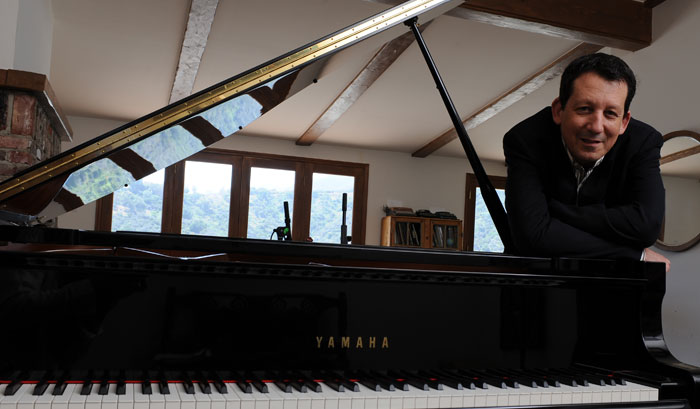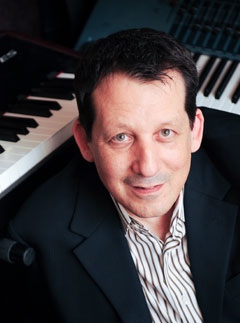


Keyboardist and producer Jeff Lorber helped define the sound of instrumental jazz with the Jeff Lorber Fusion in the mid-'70s. Since then, he's continued to make musical waves with his own records as well as collaborations with some of the genre's best-known players--including the young Kenny G, who got his first big break in Lorber's group.
I tried out a lot of pianos, and I just love the Yamaha S series.
Recently returned from a tour of Russia, Lorber is already back on the road with sax master Gerald Albright and guitarists Jeff Golub and Peter White, collectively known as "Guitars and Saxes." He's also contributing to a series of instrumental jazz covers of rap songs called Unwrapped, and plans to release his 19th album, Heard That, this summer.
What made the Jeff Lorber Fusion the right sound at the right time?
Well, it was a very exciting time in music in general. There was unbelievable creativity going on, like all the great music that Miles Davis was making, and Chick Corea, and Return to Forever, and Mahavishnu Orchestra. There was great stuff happening in R&B too, like Earth, Wind & Fire, Grover Washington, Jr., and the Crusaders. And as far as radio was concerned, there weren't such rigid categories the way it is now. Back then, the DJs would just come in and play whatever they wanted.
After your first five records you dropped the "Fusion" from your band name. Did this change reflect a different musical approach?
Well, there's really not that much difference, to be honest. It was essentially all my music. When we started out as a local band in Portland, Oregon, I called it Jeff Lorber Fusion just to let people know what they were in for. But I stopped calling it that because "fusion" became a tired word after a while.
Like the term "smooth jazz" these days?
That's another unfortunate term. At one point "smooth jazz" wasn't such a derogatory label. On the one hand, I'm grateful there are radio stations that play instrumental music--it's pretty much the only game in town, so I'm really happy it exists. But like "fusion," the term "smooth jazz" has outlived its usefulness. They should probably look for a new name. You could call it modern jazz, or contemporary jazz. What the heck--just call it jazz!

How has your music evolved over the years?
I've become more of a collaborator. I find that if I do everything myself, it tends to come out a certain way. And I think people have heard that! [Laughs.] And I've heard it. So I'm looking to learn, and expand my musical universe by working with other people. On my last record, He Had a Hat, I worked with Bobby Colomby, the original drummer from Blood, Sweat & Tears. It was more straight-ahead jazz, and it expanded a lot of boundaries for me. On this new record I'm working with a guy named Rex Rideout, who specializes in funky R&B-type tracks. I'm combining some of the grooves and flavors from the early Jeff Lorber Fusion with a more modern approach, creating something new.
You've played Yamaha pianos and keyboards for a long time.
I started using their DX7 back in the early '80s. I used to have to schlep around all this gear to get a halfway decent sound, but now I can just rent a Yamaha keyboard or two, anywhere I'm going, and I'm in good shape. I use the S90ES live a lot--it's the best-sounding non-'real' piano I've found. I really love playing that one. I usually set it up in a 90-degree position with a Motif XS6 or 7, for an organ or Wurlitzer sound.
And you also have a Yamaha DS6 Disklavier Piano.
Yeah. Love that! I tried out a lot of pianos, and I just love the Yamaha S series. Yamaha pianos are very consistent and reliable in general, and they have a certain brightness that works really well for jazz, pop, and R&B. I could be wrong, but I think they're probably used more in recordings than any other brand. And with this model, I can turn on the piano and make it play while I go into the studio and check out the sound before recording.
What are the most important things aspiring musicians should learn about their craft?
I've been doing some teaching lately, and I've been emphasizing that musicians should think about harmony and structure above all, and have an awareness of the chord changes and how the harmony moves. The melody exists within the harmony. Focusing on the melody first is kind of like looking at the windowsills and not understanding the foundation of the house. Not that the melody's not important, but you have to understand the context in which it lives. Beyond that, the simplest answer is to just stick with what you love. What you really get excited and inspired by--just stick with that.
(Photography Credit: Rob Shanahan)
























